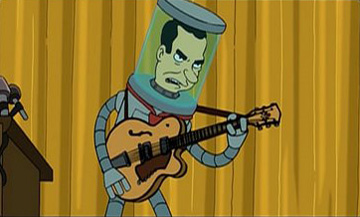Frost/Nixon
Release Date:
December 5, 2008
Limited release
Movie of the Day for Wednesday, September 10, 2008
See other Movies of the Day
On the Big Board |
| Position |
Staff |
In Brief |
| 2/98 |
David Mumpower |
This film manages the impossible by demonizing Nixon for his weakness while lionizing his strengths. Sheen, Langella, and Rockwell all deliver breathtaking performances. |
| 3/21 |
Jason Lee |
An immensely powerful story that's anchored by two phenomenal performances |
| 7/31 |
John Seal |
Do we have to wait thirty years to see Olbermann/Bush? |
| 7/43 |
Kim Hollis |
It's a great cat-and-mouse film with a lot more tension than you would expect. Both Langella and Sheen are fantastic. |
| 9/52 |
Sean Collier |
Among the year's best without question. Sort of an unlikely sports movie. |
| 16/196 |
Max Braden |
Langella was good, but I found Sheen more interesting and I think he had the harder role. The second and third acts are like the Ali/Foreman bought. |
Watergate effectively ruined the career of Richard Nixon. Disgraced and removed from office as the President of the United States, Nixon would not win another political race until the year 3000, when his disembodied head placed on top of Bender’s body would be elected President of Earth. And even then, he would win by only one vote. In the time between his fall from glory and his resurgence as the man who give Earthicans the Three Hundred Dollar Tricky Dick Fun Bill, Nixon experienced a period where he was morose and blue. A creature of politics through and through, the man had no idea how to respond to the emphatic, final nature of his separation from that aspect of his life once he had thrown it all away due to a tape recording fetish.
David Frost currently has a weekly program running on Al Jazeera television. This statement alone demonstrates what a maverick the man is. Back in the 1960s, Frost came to prominence due to his hosting a show that was an early precursor to The Daily Show. The Week That Was aka TW3 was the last program the BBC aired on Saturday nights before the stations went to static. Due to the late hour, the show was able to take great liberties with its satirical interpretations of British as well as world news. The end result was that Frost became known as a celebrity talking head with a good sense of humor. In later years, many would dispute this as Frost’s megalomaniacal behavior in his treatment of staff and co-workers is on a par with William Shatner’s behavior with the rest of the Star Trek cast. In fact, one of the people Frost discovered, John Cleese, seemed to go out of his way to shiv Frost whenever possible on Monty Python. The opinion of many who knew Frost was that his primary claim to fame was in becoming famous despite having no discernible talent, a Paris Hilton/Kim Kardashian of the 1960s.
In 1977, Frost was unemployed and desperate to find his way back into the limelight. Nixon was still dealing with the ramifications of flipping from being popular enough to be voted president to becoming public enemy number one in his home country. The two men’s fates became intertwined when Frost seized upon an opportunity to interview the disgraced ex-president. Using some of his own money to finance the project, Frost was able to coerce Nixon to appear in a series of interviews in order to tell his side of the story. Seeking some sort of redemption and forgiveness for his actions, Nixon accepted, realizing too late that exactly the same sort of psychological trap was being built for him that got Col. Jessup in trouble in A Few Good Men. And Frost was just as unlikely a man to be pulling on the snare as Lt. Daniel Kaffee was in that movie.
Even the worst enemies of Richard Nixon, people who despised everything else about the man’s life, would grudgingly acknowledge his intellect was the gold standard. Even David Frost’s mother would be forced to admit that her son, whom she believed to be a nice boy, was not as smart as Nixon. History’s best moments occur when the underdog knocks out the favorite on national television. It is true in sports and it is true in politics. In the case of the Frost/Nixon interviews, this is exactly what occurred. Frost coerced Nixon into talking about his time in the White House, the two dueled over his policies and mistakes, and Nixon was baited into having to acknowledge his mistakes, eventually apologizing publicly for the first time since leaving office.
Academy Award-nominated writer Peter Morgan chose the premise above as the topic for his first foray on the West End. The London native’s first play was so well received in his native country that it was brought to Broadway where it received similar adulation. Nixon/Frost was nominated for a Tony for Best Play and one of its two stars, Frank Langella, won Best Actor for his powerful portrayal of Nixon. Langella as well as Michael Sheen, who played Frost, will join forces once again in a theatrical adaptation of the play to be directed by no less than Academy Award winning director Ron Howard. Given the lavish critical praise of the play and its performers as well as Howard’s pedigree, this title appears likely to be a major end-of-year awards contender upon its release in December. (David Mumpower/BOP)
|
|
|
|

![]() Tweet
Tweet



